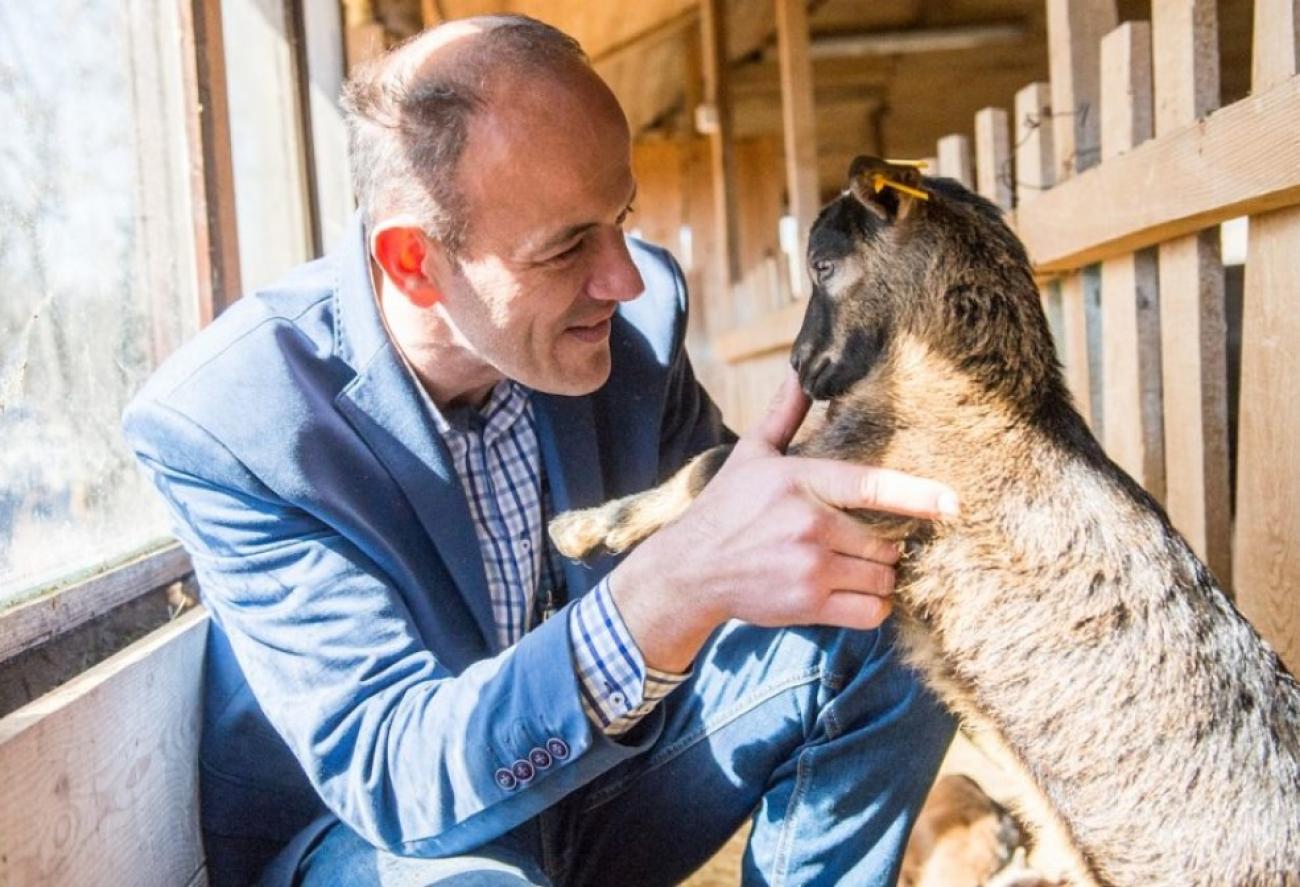A banker who became a ‘green’ farmer

As an independent producer, you also have greater freedom than as a banker. You are the master of your destiny who can provide for the family.
After 16 years in banking, Radivoje Rašo Miljanić left his comfortable existence to pursue a dream of becoming a goat farmer and organic food producer. In Montenegro, keeping goats was legally banned for decades, so this business is still considered a challenge.
“People laughed and gossiped behind my back. They said I lost my marbles because no one in their sane mind would leave a banking job for the one of a shepherd. And in Montenegro, ‘shepherd’ often has a derogatory meaning. People use it to describe someone who is an ‘uneducated peasant and a looser’.”
But, Rašo didn’t just dream, he prepared a bullet-proof green business plan. In 2012, he started a farm with 15 alpine goats. Despite financial constraints, cumbersome procedures and bureaucratic administration, now he has a herd of 250 and a dairy factory where eight employees produce organic milk, yoghurt and cheese.
“As an independent producer, you also have greater freedom than as a banker. You are the master of your destiny who can provide for the family. I believe organic food is the future of our agriculture, business and health, but it requires support from responsive and accountable institutions and a stronger link between the state and small businesses”
Rašo Miljanić
Rašo's family was worried at the start of his venture. Giving up a secure, prestigious job in a country where unemployment rate is higher than 20% and only 1.6% of labour force is employed in agriculture – made his loved ones raise eyebrows.
“My wife came to see the farm for the first time only a year later. My sister constantly cried, she thought my business was destined to fail. I knew that only results would make them believe in me. I spent five years learning about goat farming. I read all available materials, visited farms in Switzerland and attended more than 40 seminars before I bought the first goat. Eventually my wife left her job as a school pedagogist, and now she works in our dairy factory together with my two sisters.”
Not only did Rašo prove that he can provide for the family and create ‘green jobs’ but he also made his entire business ‘green’. As a certified organic food producer, he grows 8 hectares of lucerne, a type of grass suitable for grazing and as green manure. The grass is regularly tested in the lab to make sure the goats eat healthy forage and produce more and better quality milk. In the area where water is so scarce, Rašo built a rain water basin for the herd. Nothing is wasted on the farm: composting is done regularly to increase the quality of soil while food left overs go to pigs or to five beautiful shepherd dogs. The family also owns a horse, so combines and tractors are used only when necessary – because horse saves money and reduces CO2 emissions.
Rašo’s dairy factory may look modest, but he deliberately sticks to a traditional stone-and-wood ambient to improve the quality and taste of food products. Most the 2,000 litres of daily produced milk is processed into the famous goat cheese that gained several gold-awards. It is being served in 5* hotels in Montenegro, but it can also be found in the supermarkets across the country.
“I’ve always had a vision that keeps me going. I want a herd of at least 350 goats by 2020, which will hopefully create 20 new green jobs. I also work on the promotion of the Agriculture Cluster in Nikšić. I'd like to get all organic producers from this region under one roof – a traditional guesthouse and a restaurant where our dairy, meat, fruit, veg and wine would be served and sold. I also wish to help expand our local tourism offering with visits to farms, nearby monasteries, trekking tours,” former banker Rašo concludes.
Rašo also took part in UNDP’s initiative that sparked public dialogue with entrepreneurs to identify and help eliminate business barriers in Montenegro. “Montenegro has enormous potential for green growth – it has a healthy & fertile soil, clean water, still unpolluted air, good climate... But the wealth of these natural resources needs to be utilised in a sustainable manner and much remains to be done to achieve that. The first precondition is for the country to ensure economic growth that is not to the detriment of the environment. This type of growth would help open new jobs, and not just any jobs – but both decent and green jobs,” says Fiona McCluney, UN Resident Coordinator and UNDP Resident Representative to Montenegro.
***UNDP in Montenegro makes the best use of local economic opportunities to enable green growth. We help create ‘green jobs’ and employment in the formal sector. We combine economic, social and environmental approach to growth, and we do so by: eliminating barriers to business, introducing incentives for investment and job creation, establishing clusters and business zones, enhancing women entrepreneurship. At the same time, we financially support innovative projects that reduce CO2 and help fight climate change in tourism sector.


